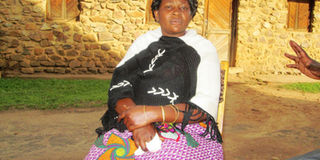Growing cancer was blamed on contraception until it was too late

Gladys Kakyene at her home in Central Ward, Kitwe Town Council, Ntungamo District. PHOTO BY Perez Rumanzi.
What you need to know:
Screening saves lives. Despite detecting early cancer warning signs in her breast and endeavouring to seek treatment in her native Ntungamo area and in Kabale, Gladys Kakyene was unable to get a conclusive cancer diagnosis until her cancer had progressed to an advanced stage which left medics with no choice but to have her breasts surgically removed in order to save her life.
When Gladys Kakyene visited several hospitals and health centres in her home area, to medical workers, her situation was a rather normal one. The only suspicion was on the contraceptive method she was using. Her fears of any cancer on her body were lowered despite feeling a stony swelling inside her breasts whenever she touched them.
Two years later, after the first visit to a health centre over the swelling, Kakyene, lost her breast to cancer after being operated on in July this year. The medics who did the final test before she was operated on said it was too late to save the breast and her life.
The mother of three lives in Runoni village, Central ward, Kitwe Town Council in Ruhaama County, Ntungamo District, with her husband Namanya Santurina Kakyene , a former radio presenter at Voice of Kigezi and a contestant for Ruhaama County MP seat.
In the beginning, Kakyene says she used to feel frosty inside the breast at times; an issue that always kept her suspicious that she may develop cancer in the breast. Whenever it would happen at night, she would go to Kabale Referral hospital in the morning for a checkup, but the checkups revealed nothing.
“I would feel cold inside the breast at night. This would stop in the morning under normal circumstances. Whenever it was too much, I would go to Kabale hospital for a checkup. I also sometimes went to private clinics and they all gave me similar results. They checked the breast, showed me how they were doing it and I would go home contented but the feeling would resurface later. They told me that it was normal, especially if I was using the (Injectaplan) contraceptive method that I was and it would end later,” Kakyene says.
Two years after the first odd feeling in her breast, Kakyene developed a hard swelling, on the top of the breast. When it appeared, she went to the same medical team who had examined her at Kabale hospital. This time, the health workers told her and her husband that the swelling would have to be operated on, but referred them to have an operation in Mbarara Regional Referral Hospital.
“We realised that there must be something wrong. If we were to be operated on, why send us to Mbarara? We refused and decided to do another test when we reached Mbarara. When the test results came out a week later, we were told it was breast cancer and that it was in its advanced stages,” she says.
When the tests were done, the doctors confirmed that Kakyene could not retain her breast and have life at the same time. She had to choose between the two. She chose to lose the breast.
Despite being seated next to her husband Namanya Santurina Kakyene, Gladys cannot hide her distress and resignation with her situation.
She tells her story with despair but her solace comes from the hope she and her husband have for the community and the realisation that she is alive and hopes she has survived. “The bad thing is that the other women in the community we live in cannot access these services when they want them. If it (cancer) could not be detected at Kabale hospital, what about someone who lives in Kitwe (the township where the two live)? It is because we knew some (key) people that we were able to access the services easily. What about these women here? I wish I had a louder voice so that I could advise government on how to deal with these cancers,” she says.
“The doctors told me the cancer was in the second stage. That is why it could be managed. When the cancer was detected, they found out it had gone 5cm from the original position when a sample muscle was taken for examination,” Kakyene explains.
When she was operated on, the whole breast muscle had to be removed. She is currently undergoing monthly treatment at Mbarara Regional Referral Hospital, where there is a fully-fledged cancer institute at the hospital. It is the only centre where after screening services can be found in the region. There are, however, five other centres where both breast cancer and cervical cancer can be screened in the region.
Mr Kakyene says while treating cancer, there is need for family support of the victims. He also says it is still very expensive despite government providing medicine free of charge since the tests are not free if someone wishes to get them in a hurry. “I was by my wife’s side and whatever she is going through, we are together. She is very strong. Cancer deserves family support like any other disease. What the government needs to do is to sensitise communities so that they can reach for services, and extend them to smaller health units. There should also be mandatory testing for sexually active women as they do for HIV in pregnant women. Maybe this would solve something,” Kakyene adds.
He believes that with the fast-spreading cancers in women, government needs to come up with a systematic effort to sensitise communities and get services nearer to the people other than travelling to only referral hospitals for checkups.


